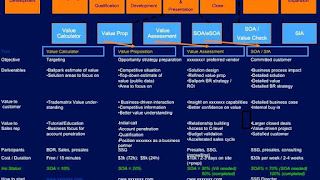Solution selling is a sales methodology. Rather than just promoting an existing product, the salesperson focuses on the customer's problems and addresses the issue with appropriate offerings (product and services). The problem resolution is what constitutes a "solution". Solution selling is usually used in sales situations where products are just one of the elements that lead to a solution. Often the real solution develops after the sales process--as with software or large plant engineering and construction projects. It is typical for solution selling situations that the buyer only rarely purchases such a solution and instead needs the knowledge of the solution partner.
So what is the definition of the word solution? The typical response is, "An answer to a problem." I agree with this response but feel it's important to expand the definition. Not only does the problem need to be acknowledged by the buyer, but both the buyer and salesperson must also agree on the answer. So a solution is a mutually agreed-upon answer to a recognized problem. In addition, a solution must also provide some measurable improvement. By measurable improvement, I mean there is a before and an after. Now we have a more complete definition of a solution; It's a mutually shared answer to a recognized problem, and the answer provides measurable improvement.
Video Solution selling
Origins of solution selling
Frank Watts developed the sales process dubbed "solution selling" in 1975. Watts perfected his method at Wang Laboratories. He began teaching solution selling as an independent consultant in 1982. He presented his sales process as a one-day workshop to Xerox Corporation in 1982. By 1983 Electronics magazine would portray solution selling as "an unmistakable trend in the distribution of systems-related products". In a 1984 account Dick Heiser could look back to IBM's pre-1975 "solution sale" methodology.
Mike Bosworth founded a sales training organization named Solution Selling in 1983, based on his experiences at Xerox Corporation (the Huthwaite International SPIN (Situation, Problem, Implication, Need-payoff) selling pilot project) and began licensing affiliates in 1988. With intellectual-property contributions from his affiliate network, Bosworth's methodology continued to evolve through the years. He sold the intellectual property in 1999 to one of his original affiliates, Keith M. Eades.
While the term "solution selling" has become somewhat generic in the marketplace, the core brand of solution selling still carries distinct characteristics. Followers of "solution-selling" generally apply a consultative sales approach to all aspects of their sales process (or cycle) including:
The solution selling methodology has evolved as key components of professional selling evolve. As a result, solution selling has become more broadly defined -- to include dimensions of "sales process", "competitive selling", "value selling" as well as "consultative selling" or "complex selling" which set the focus on the team's aspects of the sales.
Maps Solution selling
Solution selling in management contexts
The advent of solution selling may impact on business models and on organization practices. Eades and Kear discuss solution-centric organizations and the focal role of solution sales in such environments. Robert J Calvin compares some of the financial implications of various type of sales: transactional sales, value-added sales, solution sales, and feature/benefit sales. Robert L Jolles proposed that, among managers and salespeople, a chosen solution is not always the best solution.
References
Source of article : Wikipedia

